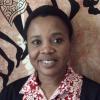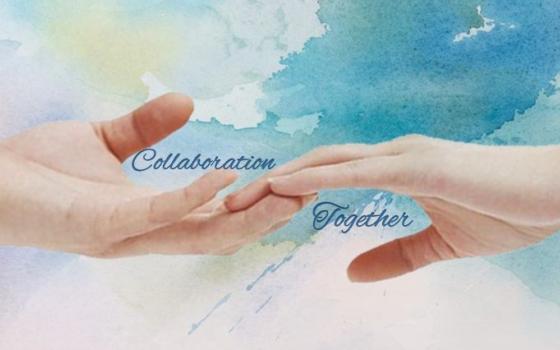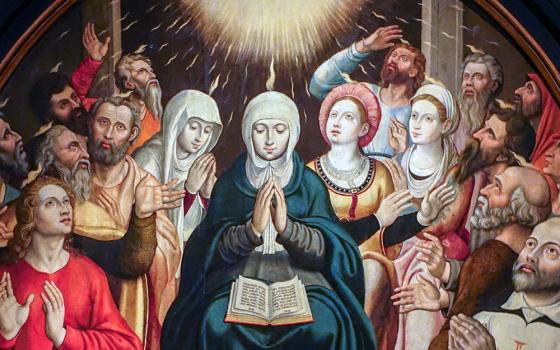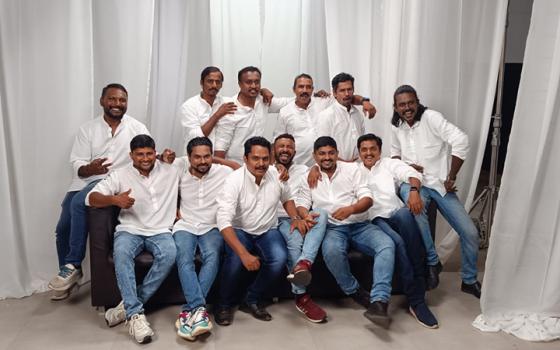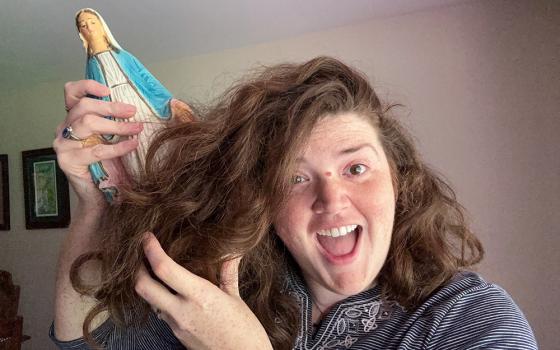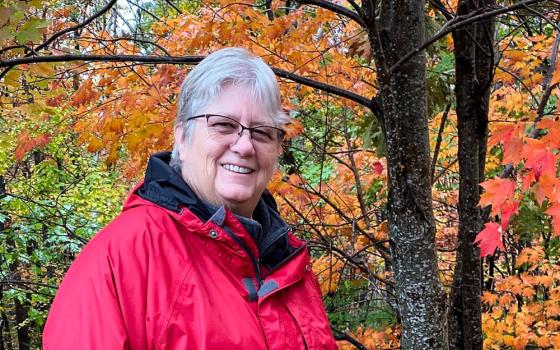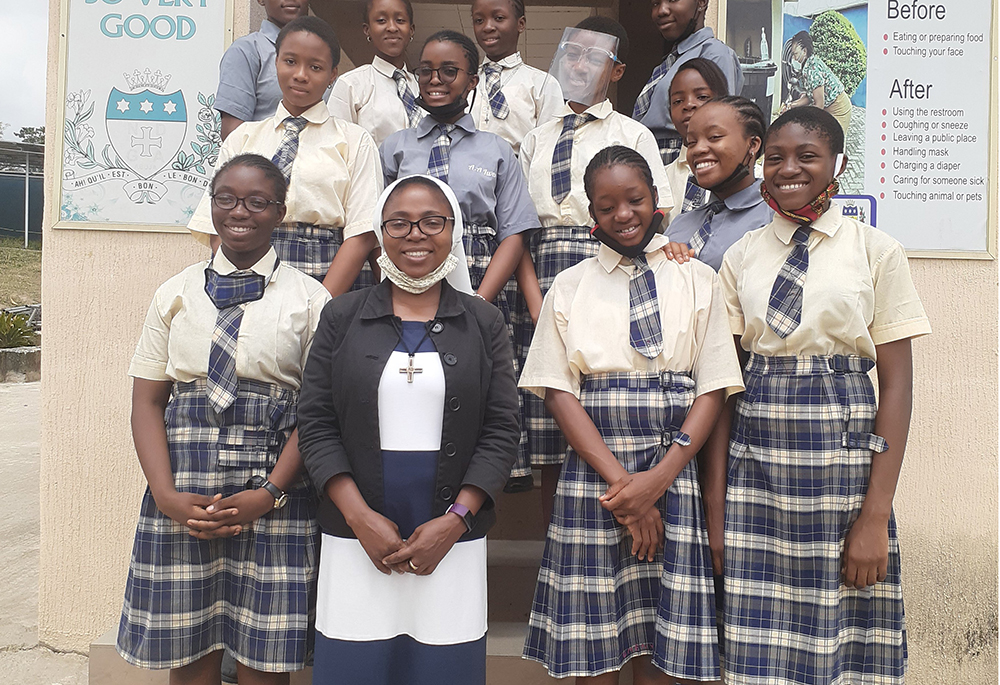
Sr. Teresa Anyabuike, a member of the African Faith and Justice Network, bottom middle, poses with students after a seminar about child abuse and human trafficking in Abuja, Nigeria. Sr. Eucharia Madueke writes that GSR coverage has enhanced the network's credibility and inspired sisters within and outside Africa. (CNS/Courtesy of Sr. Eucharia Madueke)
Editor's note: Global Sisters Report, the dynamic online community that reports on and gives voice to Catholic women religious around the world, is celebrating its 10th anniversary this year. Join us as we take another look at stories and columns published in 2014 with new updates and reporting.
In an increasingly globalized society, the media plays an indisputable role in enhancing one's visibility, shaping one's image in the public square, and in facilitating information exchange within a short span of time. The capacity to enhance one's visibility across the globe within a short space of time increases greatly with a media outlet that has a global distribution network.
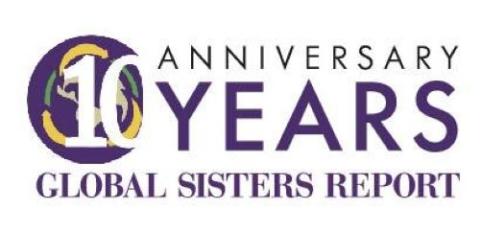
Global Sisters Report, a project of the National Catholic Reporter, with a truly global media distribution network as the name indicates, is one such network, and has played a special, and I dare say, a singular and unmatched role in enhancing the visibility and activities of Catholic sisters in Africa far beyond the continent.
Africa Faith and Justice Network's Women Empowerment Project, or WEP, was initiated in 2016 by Dominican Fr. Aniedi Okure, who, until the end of 2020, served as the executive director of Africa Faith and Justice Network, or AFJN. As he put it, he saw in the sisters powerful, nonpolitical and respectable agents for change, given the sisters' distinguished service to the vulnerable members of the society, regardless of ethnic or religious affiliation.
I was appointed by AFJN as the first coordinator of the project, and still serve in that capacity as of this writing. The project's main objective is to assist African sisters in shaping a new vision of their role in society as agents of change; to provide a platform for sisters in Africa to bring their collective moral voice to bear on the public square, so as to engage the structures and ideological systems of injustice that keep the populations they serve and others in poverty, and deprive them of their dignity as God's children.
The project also works to enhance the skills of the sisters in analyzing pertinent issues of justice within their social contexts, building coalition and mobilizing others in the society to work together for change, including public advocacy, and speaking truth to power, to promote justice and the common good of all, and to build a better society.
However, Africa Faith and Justice Network as a small, faith-based nonprofit organization is not equipped with an appropriate marketing mechanism that responds in real time to the demands of today. It lacks the capacity for global information dissemination of its many activities. Even AFJN's efforts to reach out to the African continent to share its activities often need help from credible media platforms to get its amazing and notable work out to the public.
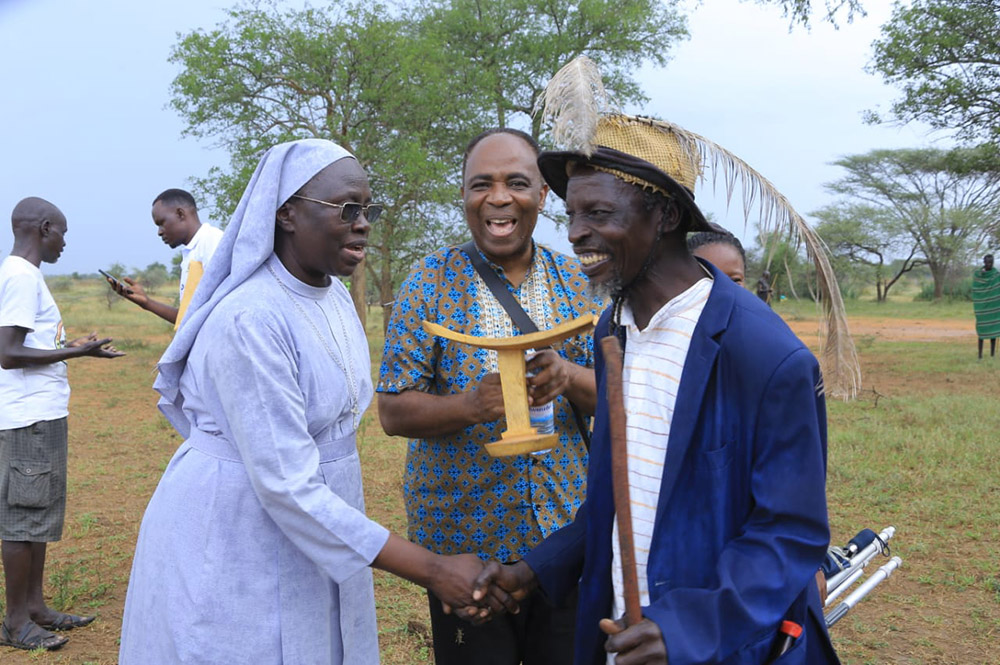
Sr. Mary Lilly Driciru of the Missionary Sisters of Mary Mother of the Church shakes hands with a Karamojong elder who helped coordinate Africa Faith and Justice Network and the local community, as Dominican Fr. Aniedi Okure holds a stool, a symbol of authority gifted to the network. (Courtesy of Mary Lilly Driciru)
One such instance of publicity help came from the National Catholic Reporter correspondent and political columnist Michael Sean Winters. In 2012, he crafted an excellent, informative piece in NCR titled "A little office that reaches a continent," which brought to the attention of a much wider audience the activities and accomplishments of Africa Faith and Justice Network.
The Women Empowerment Project has given sisters in Africa a space for expressing their collective credible voice in the public square in Ghana, Tanzania, Zambia, Uganda, the Democratic Republic of Congo, and Nigeria as they tackle structures of injustice in their countries through advocacy, building coalitions with partners, and working to change the mindset of people who, otherwise, would have been resigned to their unjust situation, and accept it as "the way things are meant to be."
Global Sisters Report, with its global outreach and trusted reputation has been a real gift, sent to the African sisters and to me in a special way, in my capacity as the coordinator of Africa Faith and Justice Network's Women Empowerment Project. GSR's positive coverage has enhanced the credibility and public trust of the activities of Africa Faith and Justice Network, and that of the Women Empowerment Project, by providing AFJN — and the sisters participating in the Women Empowerment Project in particular — the global attention and exposure which we would otherwise not have received, and by exposing the work of AFJN to critical funders and partners.
By sharing with GSR's global readers the amazing work Africa Faith and Justice Network has accomplished with African sisters in changing the structures of injustice that harm the dignity of the people they serve in their communities, and by disseminating Africa Faith and Justice Network's many activities and the sisters' contributions in advancing structural and systemic change, Global Sisters Report has made the AFJN Women Empowerment Project credible to the public, and inspiring to other sisters within and outside the African continent.
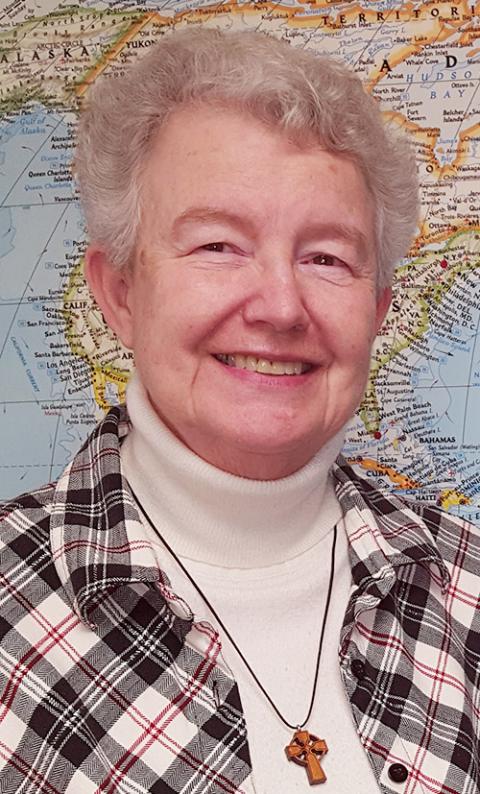
Ursuline Sr. Michele Morek (GSR photo)
As coordinator of the AFJN Women Empowerment Project, GSR has served as an avenue that empowers me to write, nurtured my writing skills, and given me a space for a voice in the public to share our work with the sisters in Africa.
I first encountered GSR in 2016 when Sr. Michele Morek of the Ursuline Sisters of Mount St. Joseph, who was on the staff of GSR at the time serving as the liaison to women religious, invited me to write a column for this reputable global media outlet. Because I had not written any piece for a media outlet with a global coverage at the time, I was apprehensive and declined the invitation. Not accepting a "no" for an answer, Sister Michele persuaded me to write. She assured me of her support by offering to edit my article when completed.
This gesture propelled me to accept the invitation. With her support and encouragement, I wrote my first article for GSR, titled "Equality or complementarity: Gender relations seen through African eyes," sharing with GSR readers the nuances of gender relations in Africa, in particular within parts of eastern Nigeria.
The recognition and validation of this first article by GSR gave me a feeling of accomplishment, inspired my confidence and gave me a positive urge to write more. Thanks to GSR for giving me a voice in the public and for offering the first lifetime privilege to write and publish an article in a global reputable media outlet as an African religious woman.
The recognition and validation of this first article by GSR gave me a feeling of accomplishment, inspired my confidence and gave me a positive urge to write more.
Since that first article, GSR has continued to provide Africa Faith and Justice Network — and the sisters in Africa we work with — positive media coverage to share critical issues facing the African people, and the sisters' continuous effort to influence change through coalition building, advocacy and public engagement. Thank you GSR for the global attention and exposure you have given and continue to give us, which we would otherwise not have received.
Having empowered me to write, GSR has also provided our network of sisters in Africa with the incentives to make their activities known through its well-known media platform. In particular, I mention here Little Sister of St. Francis Sr. Mary Rose Barnabas Kisanga in Tanzania; Notre Dame de Namur Sr. Isabelle Izika in the Democratic Republic of Congo; Religious of the Sacred Heart Sr. Kayula Lesa in Zambia; and Notre Dame de Namur Sr. Teresa Anyabuike in Nigeria, to mention a few. They have, through inspiration provided by Global Sisters Report, gained the confidence to write and publish activities of their sisters in their respective countries.
Africa Faith and Justice Network, the coalition network of sisters in African under the umbrella of AFJN Women Empowerment Project, and I, in particular as the coordinator of the project, are grateful to Global Sisters Report for amplifying African sisters' voices and activities beyond the African continent to the rest of the world.
